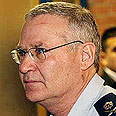
Yadlin: Hizbullah seeking revenge
צילום: חיים צח
MI chief: Financial crisis may restrain Iran
Major-General Yadlin believes high inflation, unemployment rates in Islamic republic may curb its nuclear ambitions. 'Tehran seeks to be several months away from a bomb without paying a heavy international price,' he says
Military Intelligence chief Major-General Amos Yadlin presented the government on Monday with the updated list of threats on Israel. According to Yadlin, the financial situation may have an effect on the Iranian nuclear plan.
"There is a serious economic crisis in Iran. The unemployment rate is high and the inflation is very high due to the oil prices and the global financial crisis. This could be used as a tool for restraining Tehran's nuclear ambitions," he said.
He added that Iran wants to attain a bomb, but is using caution on the way to its achievement.
"The long-term strategic goal is to obtain a military nuclear ability. But from a strategic point of view, the Iranian nuclear strategy is a cautious strategy on a broad front, on several parallel areas, without crossing red lines."
He went on to say that "Iran is working to obtain an amount of enriched uranium which would put it several months away from a bomb, without paying a heavy international price. The shift from nuclear ability to a nuclear bomb is relatively short in time."
As for the northern threat, the MI chief said, "Hizbullah is still restrained and cautious on the northern border. The restraining factors are the Israeli deterrence, the election campaign in Lebanon, the power buildup processes which have yet to be completed and its commitment to Iran.
"The recent conflict between Hizbullah and Egypt has embarrassed the organization, at a bad timing as far as it is concerned, while it is busy with the elections in Lebanon. Hizbullah is still committed to carrying out an attack to avenge the death of Imad Mugniyah, aspiring to execute an attack which would not lead to an escalation."
He also addressed the warming relations between Syria and the United States. "President Assad hopes to make a fresh start with (US President Barack) Obama. However, while Western elements are visiting the Damascus palace, Syria continues to serve as the backyard of the radical axis. Assad is letting Hizbullah and Iranian elements walk freely in Syria and advance Hizbullah's deployment on its territory."
'Obama determined to take the lead'
As for the south, Yadlin said the Hamas organization was maintaining a state of calm. "Hamas is sticking to the ceasefire and is seeking to stop the terror organizations from acting. The firing of rockets is carried out by marginal organizations and is guided by Hizbullah or inspired by the global jihad," he noted.The MI chief also addressed Israel's relations with the US, following a recent visit by Obama's special envoy to the Middle East, George Mitchell.
"The Obama administration is determined to take the lead in terms of the Mideast process, while holding an honest and supervised dialogue with the radicals. The Arab world is beginning to understand that Iran and its subsidiaries are a threat to regional order. Hizbullah's activity in Egypt is not a sole incident. Iran has infrastructure across the world aspiring to carry out attacks against Israel."
During the meeting, Prime Minister Benjamin Netanyahu addressed the negotiations with the Palestinians, saying that "the policy being formed will be based on two principles: Warding off the dangers to the State's security, while making progress in a realistic and responsible diplomatic process.
"In order to move forward, the Palestinians will have to recognize Israel as the Jewish people's national state, as a cornerstone to any future agreement. I estimate that the process of forming the policy will be completed within a month."










